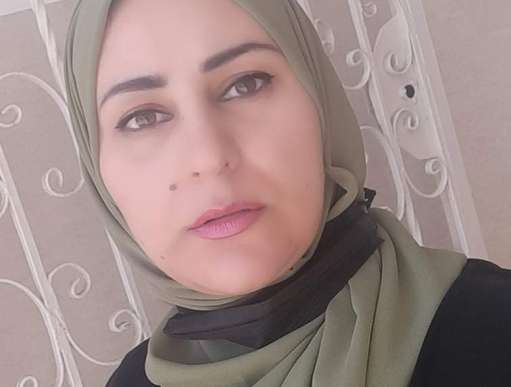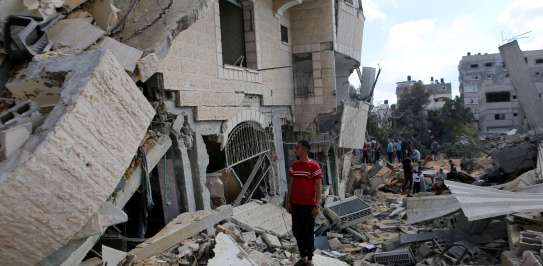Israel and the occupied Palestinian territory is seeing some of the worst violence in years. The threat of eviction by Israeli authorities of Palestinian families living in the district of Sheikh Jarrah in East Jerusalem has stoked tensions and violence between Palestinians and Israelis. At the beginning of May, Israeli police stormed Al-Aqsa mosque and used tear gas and stun grenades against people inside.
Since then, rocket fire has been exchanged between the Israeli army and Hamas, with at least 122 Palestinians being killed this week, including 31 children and over 900 others injured. Eight people have died in Israel.
Christian Aid have been hearing from Rana Abdallah who works for our local partner organisation in Gaza, the Women’s Affair Center, about what has been happening inside Gaza.

When you first hear the noise, the sound of the rocket, you feel it is going to drop nearby. At any moment you are expecting a huge explosion that will change your life.”
Rana lives in a small apartment building in West Gaza with her husband and their three children, aged six and a half, ten and twelve. She has not been able to leave her home since the airstrikes on Gaza began earlier in the week. Her family have barely slept since.
“I have witnessed several offensives in the past, this is the fourth offensive for me since I came to live in Gaza in 2000. But this one is the worst by far. People are more afraid,” Rana says.
“No place and no one is safe in Gaza. The damage is extensive. They are hitting everything; houses, schools, apartment buildings, markets, even health centres and the streets themselves. In some cases, they would give a prior warning to let people evacuate but not in all cases. This is very serious because the Gaza strip has a population of over 2 million people. It’s one of the most densely populated areas in the world,” she adds.
Rana’s friends and family have been deeply affected by the bombardment.
“A friend of mine is staying in a warehouse with her husband and four kids because she has no family in Gaza and her house was destroyed in an airstrike.”
Her brother-in-law’s business was also destroyed by a rocket. Another friend of Rana told her that she is sleeping in the same room as her four children so if a rocket does strike their home, they would at least all die together. Rana tries her best to comfort her children when they hear rockets hitting the strip, but whether close by or in the distance, the sound terrifies them.
“We felt huge explosions. The whole house shook. My children were terrified. I was holding my youngest daughter and I could hear, not just feel, her heartbeat.”
Rana told Christian Aid that she has seen a Facebook post of a father in Gaza trying to calm his daughter when she hears rocket fire by saying 'the rocket that you hear will not kill you, it is the rocket that you don’t hear that will kill you’.
Rana said, “I thought about using this with my 6-and-a-half-year-old daughter but to be honest I couldn’t. I didn’t have the heart to do it. Every time there was a huge explosion, I would tell her you are hearing it because it's loud, not because it's near. Even though at some point I would be lying but I just want to comfort her.”
“We are civilians, we don’t want to be telling our kids that the rocket that you hear will not kill you, it is the rocket that you don’t hear that will kill you. We want to live in peace, we want our kids to live in peace. This is the third offensive for my eldest. She shouldn’t have to go through this,” Rana added.
Rana explains that the situation is getting worse. She fears shops will soon begin running out of food to sell in a matter of days. The Kerem Shalom border crossing between Israel and Gaza has been closed which she worries will lead to severe fuel shortages which will affect the provision of key services including health services.
“Gaza has been under siege for almost 14 years now, the health system has been overstretched for many years and during the coronavirus pandemic, it has gotten worse,” Rana says.
“This offensive will make the humanitarian situation worse because the health sector has been struggling for a long time from poor medicine supplies, from lack of medical equipment and also the effects of the electricity cuts. At its best, we have electricity for only eight hours a day, sometimes only two. For hospitals to operate, we need a lot of generators and a lot of fuel to operate them,” Rana says.
As she explains, the airstrikes are creating a scenario where it is almost impossible for those with coronavirus to seek medical treatment if they need it.
“With the high number of people hurt, health services will focus only on the injured. We have seen urgent appeals for people to go and donate blood for the injured. But not all people can leave their houses so how can they donate blood? What happens if people get coronavirus? How can they go to hospital, what can they do when the hospitals are really overstretched with the injured?” Rana says.
Rana is dreading the worst-case scenario, a ground invasion by the Israeli army, and worries about what that would mean for the people of Gaza.
“Similar to previous ground invasions, we are very afraid they will use white phosphorous if there is another invasion.”
As we wrapped up our discussion, a rocket landed in the distance. Rana finished by explaining that while this isn’t the first offensive she has lived through; she is deeply concerned for what lies ahead.
Let the world know about our suffering, that we are people who want to live in peace, we have the right to life. When you ask me what is your greatest fear, I fear that death is around. Maybe we will not be able to escape it this time.
